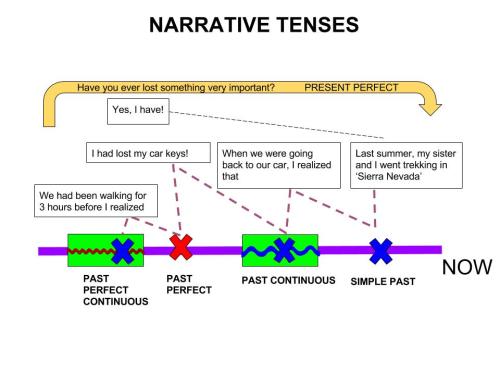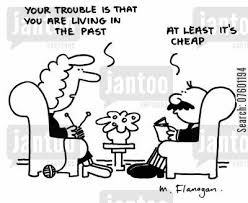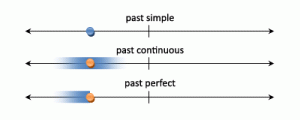NARRATIVE TENSES are verb tenses that are used to talk about the past. They are often found in stories and descriptions of past events, such as personal anecdotes.
 Past time is expressed through different grammatical elements in English:
Past time is expressed through different grammatical elements in English:
1- The past tense relates to an action (or state) that is finished or happened at a definite point in the past.
1.1. Past Simple: He was in prison for 3 years (now he’s out).
1.2. Past Continuous or Progressive: It was raining when I left (now it’s not).
See more examples below
2- The present perfect isn’t a past tense as such, however, it relates to an action (or state) that started at some point in the past and is connected to the present time (it still continues or has just finished).
2.2. Present Perfect Simple –Have you ever lost something important and got into trouble because of it? (This is one of the uses of the Present Perfect, used to talk about life experiences. The answer to this question ‘Yes, I have’, may continue with an anecdote narrated using different past tenses, see example picture above).
2.3. Present Perfect Continuous or Progressive – I have been working here since the summer (emphasis on the extent/duration of the action).
See more examples below
3. The past perfect is used to connect two past actions in chronological order, that is the past of the past. You have a past simple event and another past event further back in time – the past perfect:
3.1. Past Perfect Simple: I had already left the house when the thieves broke in.
3.2. Past Perfect Continuous or Progressive: He had been working for 3 hours before I rang.
See more examples below
4. Adverbials: Adverbs (yesterday), Adverbial phrases (two weeks ago), Prepositional phrases (in the last month), Conjunctions (when I left school).
5. The present tense with past meaning is used for vividness when telling a story or anecdote. The curtain raises and Juliet is in bed; suddenly, the window opens and Romeo jumps in.
1.1. Examples of different uses of the past simple:
- Haydn was born in 1732. These ruins were discovered in the eighteen century (we use adverbials to refer to a past point or period of time).
- Did the postman come? (context: we know that the postman comes everyday at the same time, so we don’t need to add any time expression).
- They told me you were ill (we can use the past simple when no apparent definite time exists).
- I bought this dress in Paris (we can also use the past simple without mentioning a specific time in the past, it is probably irrelevant in many contexts).
- He married secretly; his mother was shocked (here we don’t need to mention when, as the important thing here is “secretly” and that’s why his mother was shocked)
- Where have you been? I’ve been to the cinema. Did you enjoy the film? (questions after a present perfect).
- If I went to London, I would visit The Parliament (Conditional Sentence 2)
1.2. Examples of different uses of the past continuous:
- She was having lunch (a past action whose exact limits are unknown or unimportant)
- When I arrived, Ally was having lunch (same as above, but with a time expression, we are describing an action going on when I arrived).
- He was having breakfast at 8 (a past action with a point in time – at 8 – expressing that the action started before it and continued after it).
- It was raining outside and the dog was sleeping in front of the heater (descriptions, note that two actions may happen together or at the same time)
- What were you doing before you came here? (asking about periods of time)
- I was talking to Paul the other day and he told me you’re pregnant, Congratulations! (in spoken English, if you want to give the impression that the action was casual or a coincidence, you use the past continuous. Compare with “I talked to Paul the other day and he told me…” this example indicates that I took the initiative to talk to Paul, it wasn’t just a coincidence) .
2.1. Examples of the Present Perfect Simple:
- This house has always been empty (and still is). (A state leading up to the present time).
- Have you ever been to the US? (An indefinite event leading up to the present time).
- They’ve attended classes regularly this term. (A habit in a period of time leading up to the present)
- The flight has arrived, let’s rush to the gate. (A past event, recently finished with results in the present)
2.2. Examples of the Present Perfect Continuous or Progressive:
- What have you been doing this evening? I have been writing a letter to my nephew. (Actions leading up to the recent past, the letter has been written. Here, I also want to emphasise the duration of the action. It has the same meaning as the Present Perfect Simple except for the emphasis on the duration of the period leading up to the present).
- You’ve been fighting I can see the bruises on your face. (The effects of the past action still remain in the present)
- I’ve been reading your book. (This example, however, means that I’m still reading your book, I haven’t finished it yet. If I say: “I have read your book already” I mean that I’ve finished it recently).
- How long have you worked here for? Or, How long have you been working here for? (These examples mean the same, I use the continuous form for emphasis on the period of time. The same happens with the following verbs: live, study, learn, and wait).
3.1. Examples of the uses of the Past Perfect Simple:
- The house had been empty for several moths when I bought it. (The past of the past).
- He refused to go until he had seen all the pictures.
- Mary had left the house, when/before John arrived. (Both actions are complete)
- After the speaker had shouted angrily, the audience kept silent.
- He said he had been in England five years ago. (Indirect Speech).
3.1. Examples of the uses of the Past Perfect Continuous:
- At 7 pm he had been working for 8 hours, he was very tired. (A past action that continued up to the past point mentioned, duration is being focussed here).
- He had been trying to get her on the phone. (A repeated action in the past, we don’t know If he finally got her).


